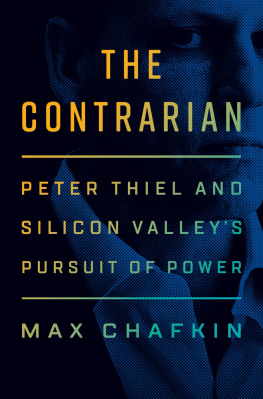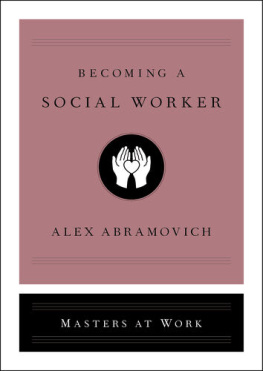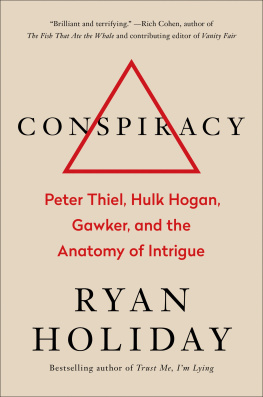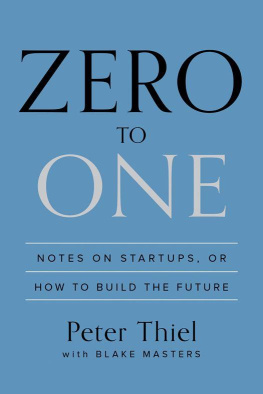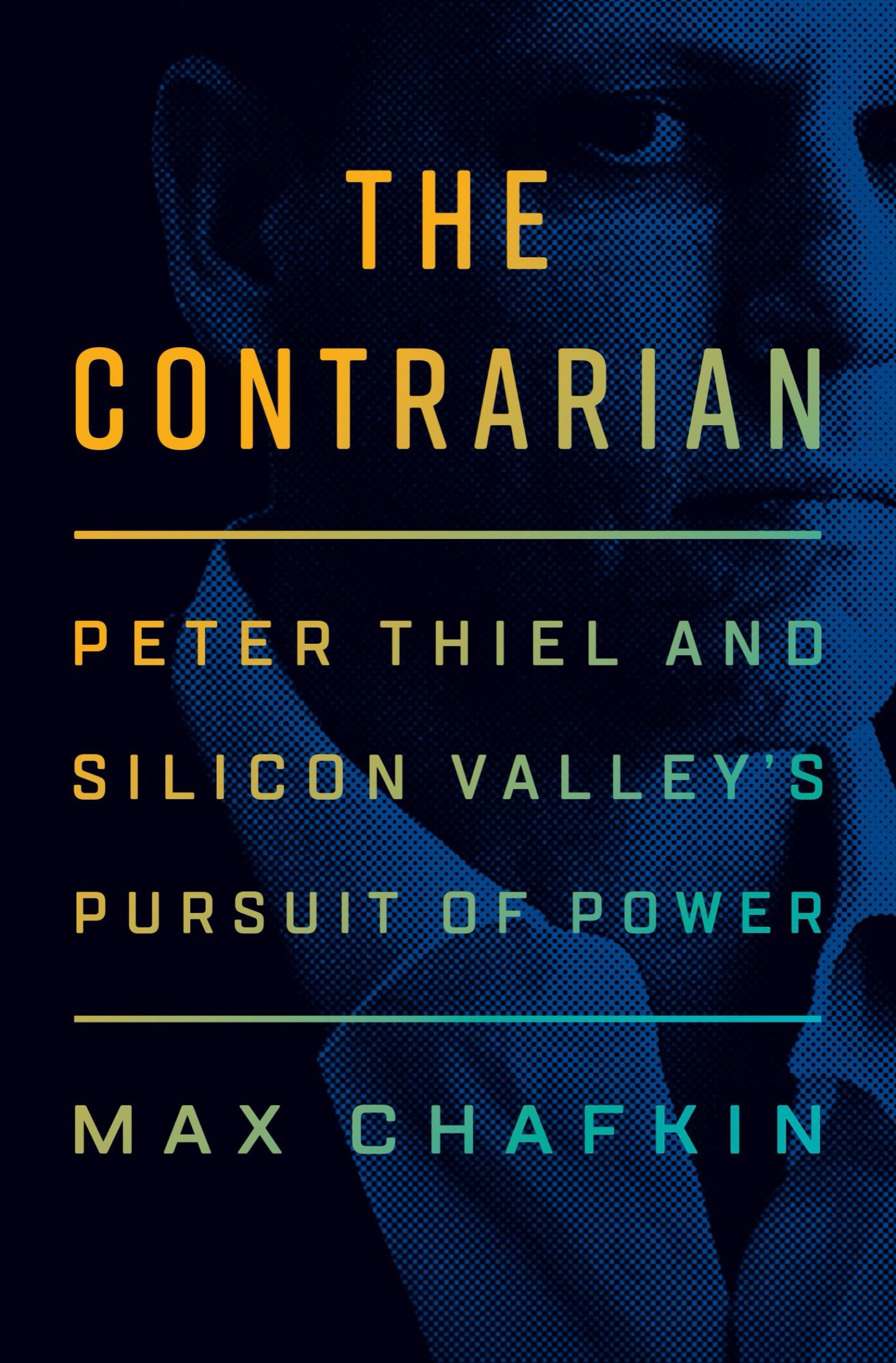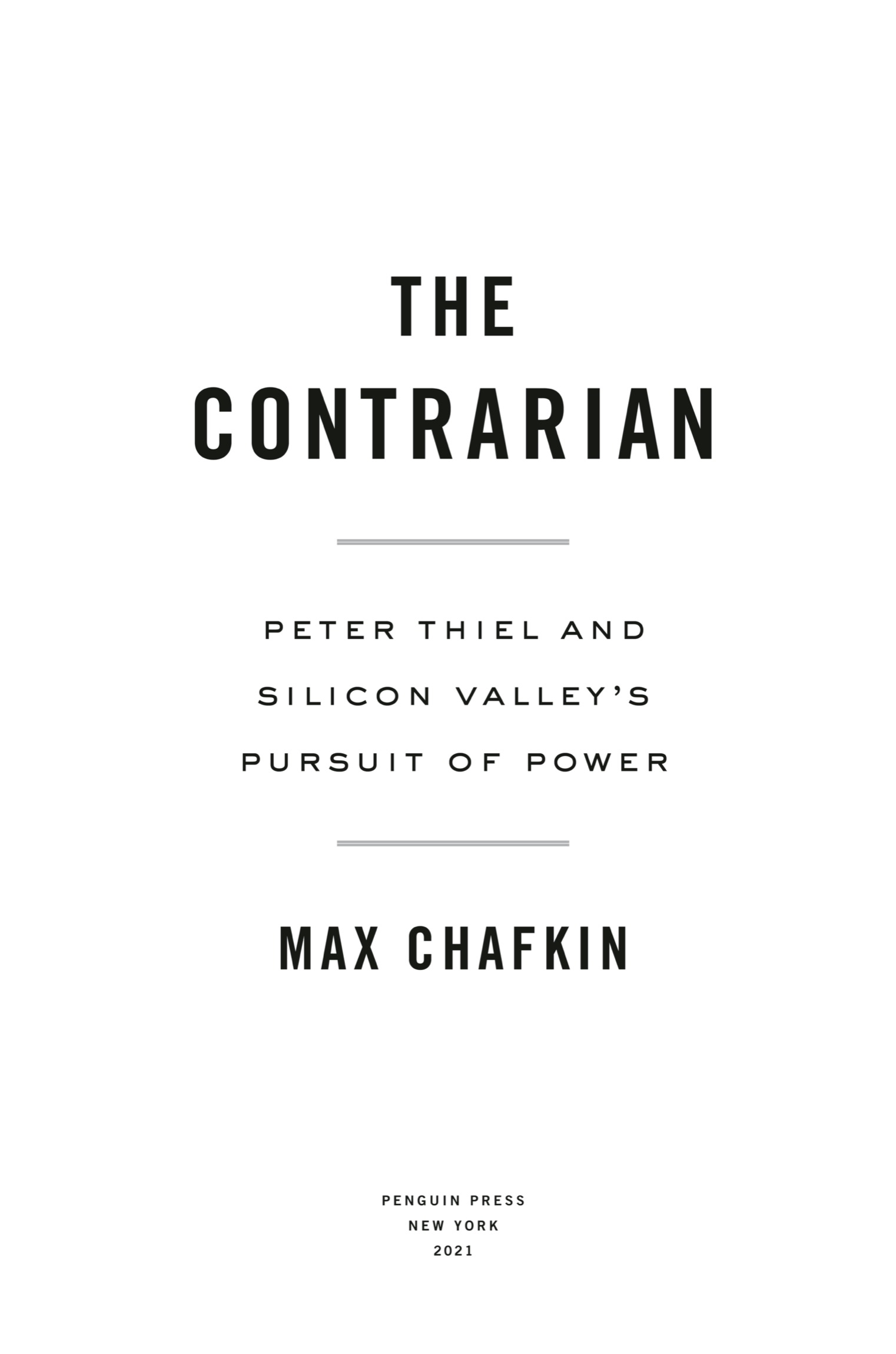Penguin supports copyright. Copyright fuels creativity, encourages diverse voices, promotes free speech, and creates a vibrant culture. Thank you for buying an authorized edition of this book and for complying with copyright laws by not reproducing, scanning, or distributing any part of it in any form without permission. You are supporting writers and allowing Penguin to continue to publish books for every reader.
Image credits appear on .
Names: Chafkin, Max, author.
Title: The contrarian: Peter Thiel and Silicon Valleys pursuit of power / Max Chafkin.
Description: New York: Penguin Press, an imprint of Penguin Random House LLC, [2021] | Includes bibliographical references and index.
Identifiers: LCCN 2021007920 (print) | LCCN 2021007921 (ebook) | ISBN 9781984878533 (hardcover) | ISBN 9781984878540 (ebook) | ISBN 9780593300619 (international edition)
Subjects: LCSH: Thiel, Peter A. | Capitalists and financiersUnited StatesBiography. | Santa Clara Valley (Santa Clara County, Calif.)Biography. | Power (Social sciences)
Classification: LCC HG172.T46 C43 2021 (print) | LCC HG172.T46 (ebook) |DDC 332.092 [B]dc23
INTRODUCTION
It may seem hard to remember, but there was a time when the world seemed ready to put Silicon Valley in charge of everything. This was 2016the Age of Unicorns, as business magazines called it, referring to tech companies that were growing so quickly, and had become so valuable, that they seemed almost mythical. Jeff Bezos had saved one of Americas great newspapers, Mark Zuckerberg was romancing San Francisco politicos, whod just named a hospital after him, and transportation activists were showing up in major cities to protest in favor of the disruptions brought on by Uber. President Barack Obama, his term winding down, was musing about relocating to California and becoming a tech investor as his next act. Venture capital, he told to reporters that spring, sounded like it could be very satisfying.
But even as the zeitgeistall the way up to ambitions of the leader of the free worldcelebrated the promise and potential of Silicon Valley, one of Silicon Valleys pioneers had already turned his attention well beyond it. Over the prior two decades, Peter Thiel had accumulated billions of dollars in wealth, backing some of the biggest and most successful tech companies, including Facebook, PayPal, and SpaceX. Hed built a network that gave him access to the best entrepreneurs and the wealthiest investors in the world, and he was idolized by a generation of aspiring startup founders. But Thiel wanted more than sway in Silicon Valleyhe wanted real power, political power. He was about to be handed an opportunity to seize it.
It came in the form of what appeared at first to be a minor scandal at Facebook, where Thiel had been an early investor. That May, the tech blog Gizmodo published a report claiming that the opinions of conservatives were being systematically suppressed by the social network. A small team of editors working on a new feature called Trending Topics said theyd been instructed to include stories from mainstream outlets such as CNN and The New York Times, but to leave out stories from right-wing media as well as those about fringe topics popular among conservatives, such as the unverified claim that the IRS had been targeting Tea Partyaffiliated nonprofits.
The scoop was modestTrending Topics had nothing to do with the regular news feed, which was curated by algorithm and was full of right-wing contentbut it enraged conservatives, who saw it as proof that Facebook was biased in a broader way. The Drudge Report, which had been among the banned outlets, led with a giant and unflattering picture of Zuckerbergs deputy Sheryl Sandberg, the author of the book Lean In. not leaning in... leaning left! the headline screamed. facebook under fire was the Fox News chyron.
Facebook denied the allegations, but Zuckerberg sensed that this was a crisis to be managed, and he turned to Thiel to help him. On Wednesday, May 18, a group of sixteen prominent right-wing media personalities were summoned to Menlo Park for a meeting. They included talk show hosts Tucker Carlson, Glenn Beck, and Dana Perino; the presidents of the Tea Party Patriots, the American Enterprise Institute, and the Heritage Foundation; and a handful of others. Officially, they were there to see Zuckerberg and Sandberg, but Thiel was the reason many of them had made the trip.
At forty-eight, he was more than a decade older than the Facebook founder, but the two men had much in common. Like Zuckerberg, Thiel was ruthlessly competitive and awkward in social situations. Theyd been closeThiel had been Zuckerbergs mentor and his patron, the first outside investor in his company and the first person in authority to grasp that Zuckerberg actually knew what he was doing.
Years earlier, Thiel had seen in the Facebook founderan abrasive, socially inept young man whose chief business qualification at the time was that hed hacked together a way to rate the attractiveness of his female classmates at Harvardsomething huge. After investing in Facebook, Thiel had set up Zuckerberg with absolute control over it, helping to transform the kid with the words Im CEO... Bitch on his business cards into the fairly polished capitalist he would become. The relationship had made both men spectacularly rich, and though Thiel no longer owned much Facebook stock, he remained on the companys board and was still very much invested in its influence.
Zuckerberg and Thiel had drifted apart over the previous few years, as Thiel had become more entrenched in the world of conservative politics and Zuckerberg had embraced the spirit of the Obama era, starting a lobbying group aimed at promoting business-friendly immigration reform and pledging billions to the causes of advancing human potential and promoting equality.
But even as he cultivated Obama and others on the left, Zuckerberg had continued to rely on Thiel as a liaison to the American right. Thiel, according to Zuckerbergs allies, was the companys conservative conscience. Mark wants to have a balance at Facebook between left and right, said a former Facebook executive. He doesnt think he can have a healthy debate if everyones a bleeding-heart Democrat. Zuckerbergs critics saw Thiels influence on the company as more profoundand more pernicious. He was, in this view, the puppet master: pushing a younger, ideologically uncertain founder toward an alliance with an extremist wing of the Republican party.
As the group of conservative leaders arrived at Facebooks sprawling Frank Gehrydesigned headquarters, Thiel and Zuckerberg were a study in shifting generational attitudes toward the concept of business casual. The Facebook founder wore his usual uniform, a gray T-shirt and jeans. Thiel wore a dress shirt with the sleeves rolled up and a pair of hemp-soled shoes. As usual, he carried himself as if braced for a collisionhis shoulders hunched forward, his head tucked ever so slightly.
The group sat down at a large table, and Zuckerberg and Sandberg led them through a dense, technical presentation designed to explain that Facebooks software, not editors, selected the vast majority of articles that appeared on Facebook. Zuckerberg asked if there were any questionswhich the pundits took as an invitation to light into Facebook, the companys left-leaning employees, and the general sense that Silicon Valley favored liberal causes.

